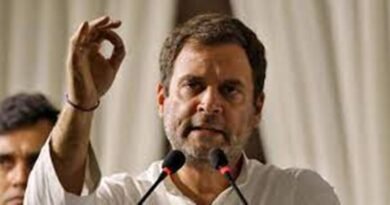BJP Has Made the Bharat Ratna an Electoral Tool – and Nothing Else
This was already visible in 2019, when it proposed the Bharat Ratna for V.D. Savarkar in its Maharashtra election manifesto.
New Delhi, February 20, dmanewsdesk: The Narendra Modi regime’s decision to confer the Bharat Ratna on L.K. Advani, a Hindutva icon, a few weeks after it announced the same honour posthumously on Karpoori Thakur for his stellar role in reserving jobs for Other Backward Classes (OBCs) in Bihar in 1977 smacks of political motives.
Cocktail of Mandal and Kamandal
Advani’s Rath Yatra advocating for a Ram temple exactly where the Babri Masjid stood aimed at countering the V.P. Singh government’s historic implementation of the Mandal Commission report, recommending 27% reservation for OBCs in government jobs. In popular perception, this Yatra represented Kamandal, associated with Hindutva, as opposed to Mandal representing affirmative action. The BJP under Advani looked at reserving jobs for OBCs as dividing Hindus based on caste; it entertained the hope that the Yatra would unite Hindus on a Hindutva plank. It was also an attempt to unleash forces for cultural nationalism as opposed to the constitutional vision of a secular India .
Now, awarding Advani and Karpoori Thakur at the same time, in the words of The Wire‘s founding editor M.K. Venu, is a “perfect cocktail of Mandal and Kamandal” – a shrewd political move ahead of the 2024 polls.
BJP’s Maharashtra manifesto
This isn’t the first time a Bharat Ratna award has been seen in this way. In 1988, when Prime Minister Rajiv Gandhi posthumously bestowed the Bharat Ratna on the late chief minister of Tamil Nadu M.G. Ramachandran, it was widely viewed in the media as an attempt to enhance the Congress party’s electoral fortunes in the 1989 elections.
However, no political party in India has politicised the Bharat Ratna like the BJP has. In 2019, in its manifesto before the Maharashtra assembly elections, it promised to confer a Bharat Ratna on V.D. Savarkar. He preceded Mohammed Ali Jinnah in saying that Hindus and Muslims constituted two separate nations, and none other than Sardar Vallabhbhai Patel wrote that a fanatical wing of the Hindu Mahasabha led by Savarkar had conspired to kill Mahatma Gandhi.
President K.R. Narayanan had rejected the Bharat Ratna for Savarkar in 2001, after Prime Minister Atal Bihari Vajpayee suggested his name. Vajapyee agreed to Narayanan’s proposal in 2000 for the Bharat Ratna for shehnai maestro Bismillah Khan.
Also read: Why Bharat Ratnas to Karpoori and Advani Reveal That Mandal and Kamandal Are Polls Apart
Both the president and prime minister take the decision to confer a Bharat Ratna. Narayanan proposed Khan’s name and the prime minister agreed, while in turn proposing the name of Savarkar. Narayanan sat over the proposal for several months. When on the occasion of Vajpayee’s birth anniversary on December 25, 2001 Narayanan visited him to convey his greetings, Vajpayee told that he was withdrawing his proposal for Savarkar as he felt that it was pending with the president for a long time and so he was not inclined to approve it. He requested Narayanan to accordingly dispose of the file, recording approval for the Bharat Ratna for Khan. It is rather strange that 20 years after that incident, the possibility of a Bharat Ratna for Savarkar was used as bait for an election.
How the Jan Sangh went against Karpoori Thakur
It will never be forgotten that when Karpoori Thakur as chief minister of Bihar introduced 26% reservation for OBCs and marginalised sections in government jobs in 1978, it was the Jan Sangh (the BJP’s predecessor) which opposed it and caused the fall of the state government. It also used abusive language against Thakur and RSS cadres – most hailing from the ‘upper’ castes – did not spare even his mother. They coined a highly offensive slogan, “Ye reservation kahan se aai, Karpoori ke mai biyayi (Where did this reservation come from? Karpoori’s mother has birthed it).”
After announcing the Bharat Ratna decision, Modi said that he used to hear about Thakur’s pioneering role on social justice from the then Jan Sangh leader of Bihar, Kailashpati Mishra. What he said lacked conviction.
If the Modi government was so keen to recognise leaders of the social justice movement, it should have long back honoured Tamil Nadu’s legendary leader K. Karunanidhi. He was an exemplary product of the Dravidian movement which pioneered the cause of social justice in India from the 1920s. An extraordinary leader of India’s public life, he as the chief minister of Tamil Nadu during 1969 and 1971 preceded Karpoori Thakur in taking numerous measures including increasing the quota for OBCs in his state from 25% to 31%.
By celebrating Thakur and ignoring Karunanidhi, the Modi regime has proved it is more interested in pursuing its electoral prospects in the Hindi heartland of the north, where it is advantageously placed, than in the south.
It is preposterous to determine the worth of a person based on electoral outcome. Yet, that’s exactly what the BJP is doing.
Source: The Wire




